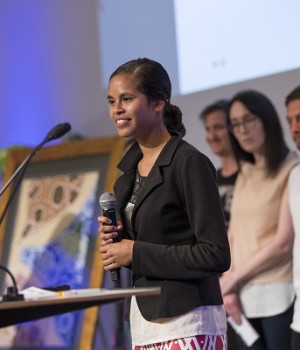Five innovative Indigenous start-ups have been selected to attend a ‘mini’ four-week business-accelerator program at The Capital, the recently opened dedicated venue in Brisbane’s CBD for digital technology startups and entrepreneurs.
The program is in partnership with Slingshot, offered by Barayamal, a new not-for-profit business, which will run Australia’s first Indigenous accelerator program from mid-2017.
CEO of Barayamal, Mr Dean Foley, said an accelerator typically helps start-ups to gain access to business networks, knowledge, expertise and early-stage funding they need to build successful businesses.
“Now Aboriginal and Torres Strait Islander entrepreneurs will have their own accelerator to turn to for such support. The support will also include world-class entrepreneur programs from Australia’s leading corporate accelerator, Slingshot and will offer one-on-one mentoring with successful Indigenous and non-Indigenous entrepreneurs,” Mr Foley said.
CEO of Slingshot, Karen Lawson explained “We are delighted to partner with Barayamal to create new opportunities for indigenous founders to grow and accelerate their business. We are passionate about diversity and inclusion and are excited by the opportunity to address this within the indigenous community.
“The quality and depth of our program has been recognised by universities and when this is combined with our world class mentors, we have proven that our accelerator will equip entrepreneurs with skills, knowledge and connections to deliver commercial outcomes.
“Over four weeks, participants will learn contemporary techniques for taking their business ideas step by step through the essential stages,” she added.
What will the Barayamal program entail?
Barayamal means ‘Black Swan’ in Kamilaroi language and the goal of the program is to help Aboriginal & Torres Strait Islander people build successful businesses through entrepreneurship training and programs.
Black swans were first seen by Europeans in 1697 but before that, Europeans had only known of a white swan. In this instance, the black swan represents Indigenous entrepreneurs who have not been noticed in the world for their innovative businesses. Barayamal plans to show the world that Indigenous entrepreneurs exist and they can also build global businesses.

The full Barayamal Indigenous accelerator start-up program, set to kickoff mid next year, will be similar to the mini accelerator program, but will be more intensive, provide early seed funding and run for 12 weeks.
The programs will initially be held at Fishburners, a sleek new business co-working space within The Capital, with the goal of expanding the Barayamal Indigenous accelerator startup program nationally in the future.
The Capital was officially opened by Lord Mayor Graham Quirk on 20 October, 2016, who said “The Capital will continue Brisbane’s momentum as a centre for innovation in the Asia Pacific region.”
Mr Foley said Aboriginal and Torres Strait Islander entrepreneurs can make a valuable contribution to this momentum towards innovation if they build and grow companies with a global impact.
“The Barayamal Indigenous accelerator program wants to help Indigenous entrepreneurs achieve just that,” he said.
The accelerator programs come in the wake of the success of Australia’s first Indigenous Startup Weekend, co-organised by Mr Foley, which took place 26–28 August, 2016 at the State Library of Queensland.
Barayamal is planning a further four nationwide Indigenous Startup Weekends in 2017.

What five start-ups will be joining Barayamal?
Virtual Maiwar: To develop an application to showcase the First Nations cultural heritage of the Brisbane River as it might have been before First Settlement.
Hum Drum: Connecting musicians and performance lovers
Spirit of Country: Spirit of Country will distribute Australian indigenous culture to the world by providing Indigenous tourist packages to International tourists.
Realty Checks: Provide a centralised live database that will allow property managers to keep all information in a central cloud based location, which will allow the landlord to seamlessly view statements, invoices and previous inspections complete with photos.
Yulngu App: Mobile application that enables Aboriginal and Torres Strait Islander art to upload and sell their art direct to customers, which will allow these artist to keep 70% of the sale instead of only 3%.
The start-up founders were selected through a competitive application process.

Indigenous businesses deserve more
We caught up with the organiser, Dean Foley to share more with Anthill about Indigenous entrepreneurs, in the interview below.
What problems are unique to Indigenous founders and how will this program tackle these particular problems?
Indigenous businesses are often not taken seriously by investors and potential partners. The founders and their concepts may be seen as a novelty rather than a serious business proposition. External stakeholders will also put their name on something but rarely commit with time and money to ensure its success, as they do in the broader market.
A lack of intergenerational wealth transfer means Indigenous Australians often lack cash, assets and the family financial support to develop their concept to an MVP (minimum viable product) stage, which is when investors and partners are most interested in exchanging equity.
Now Aboriginal and Torres Strait Islander entrepreneurs will have their own accelerator to turn to for such support. The support will also include world-class entrepreneur programs from Australia’s leading corporate accelerator, Slingshot and will offer one-on-one mentoring with successful Indigenous and non-Indigenous entrepreneurs.
What does the Australian business/start-up community as a whole need to do to become more inclusive, especially to indigenous entrepreneurs?
Programs aimed at Indigenous entrepreneurs should be customised to the unique needs of Aboriginal and Torres Strait Islander peoples. (E.g., an investment program requiring high levels of security or benchmarking standards of “tertiary educated only” will not be successful in the space)
Increased interaction and partnerships between mainstream incubators, accelerators, start-up spaces and existing Indigenous business entities such as Barayamal, Australian Indigenous Chamber of Commerce, Indigenous Business Australia, Supply Nation etc.
Increase support and resources aimed at wider array of business sectors – often support for Indigenous entrepreneurs is aimed at sole proprietor type businesses, however these usually require the least amount of seed capital, subsequently leaving start-ups with global ambitions high and dry.






![How to secure lucrative sponsorships in five steps [CHEAT SHEET]](https://anthillonline.com/wp-content/uploads/2016/02/jackie-fast-meme-04-300x194.jpg)
![Do you have happy staff? 5 ways to improve performance [FREE DOWNLOAD]](https://anthillonline.com/wp-content/uploads/2016/06/chris-smith-cheatsheet-04c.pdf-Box-2016-06-30-20-45-20-100x75.png)
![Five essential things to get right if you want to raise capital, with Bryan Vadas [FREE CHEAT SHEET]](https://anthillonline.com/wp-content/uploads/2015/08/vadas-3d-cover-01--100x75.png)
![Instagram for Business… in 12 steps [FREE INFOGRAPHIC]](https://anthillonline.com/wp-content/uploads/2015/08/Capture7-100x75.jpg)
![Ever considered crowdfunding? [FREE REPORT]](https://anthillonline.com/wp-content/uploads/2017/03/liz-wald-100x75.png)
![The Alchemy of Negotiation with Matt Lohmeyer [FREE REPORT]](https://anthillonline.com/wp-content/uploads/2015/07/Capture-100x75.jpg)
![How do you become the fastest growing eCommerce site in the history of the internet? [VIDEO]](https://anthillonline.com/wp-content/uploads/2013/03/Fab-300x350.jpg)

![Hi there, here are 7 ways to make a conversation with anyone you meet [VIDEO]](https://anthillonline.com/wp-content/uploads/2016/06/conversation-300x350.jpg)
![Your life is not measured only in years, it is measured by your achievement [VIDEO]](https://anthillonline.com/wp-content/uploads/2013/02/BruceMcLaren-300x350.jpg)
![How did three lads in their twenties raise $250k in angel money for an app? [VIDEO]](https://anthillonline.com/wp-content/uploads/2012/11/121cast-300x350.png)
![How to market your business when you don’t have a business yet [CHEAT SHEET]](https://anthillonline.com/wp-content/uploads/2016/01/oli-gardner-memes-02-100x75.jpg)
![Learn how to use Instagram as a business tool [FREE INFOGRAPHIC]](https://anthillonline.com/wp-content/uploads/2012/12/nickelbackinstagram-100x75.jpg)
![The Ultimate Social Media Almanac with James Tuckerman [Cheat Sheet]](https://anthillonline.com/wp-content/uploads/2015/11/Screen-Shot-2015-11-26-at-11.24.55-100x75.png)
![Five ways to manage your time by managing yourself, with Helen Ebdon [CHEAT SHEET]](https://anthillonline.com/wp-content/uploads/2015/07/ebdon-3d-cover-01--100x75.png)
![New Zealand’s Xero eyes US IPO, further disruption as subscribers increase [INFOGRAPHIC]](https://anthillonline.com/wp-content/uploads/2014/07/sruuuuujana-212x194.png)
![Ever wonder if your ‘content marketing’ is really just crap? You gotta see this! [INFOGRAPHIC]](https://anthillonline.com/wp-content/uploads/2014/08/content-100x75.jpg)
![7 Business Lessons From Game of Thrones [INFOGRAPHIC]](https://anthillonline.com/wp-content/uploads/2014/10/infographic-games-of-thrones-041-100x75.jpg)
![How to build your own Media Empire… In seven steps with Nathan Chan [INFOGRAPHIC]](https://anthillonline.com/wp-content/uploads/2014/10/Nathan-Chan-Infographic-e1413419529176-100x75.jpg)
![5 Business Lessons From Tinder [INFOGRAPHIC]](https://anthillonline.com/wp-content/uploads/2014/10/Tinder-Elegant-Infographic-100x75.jpg)



